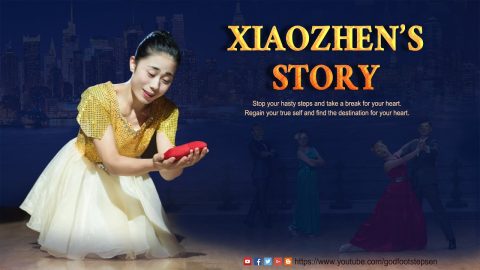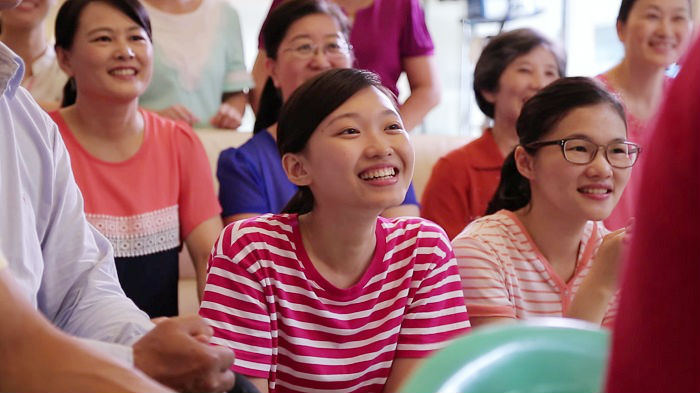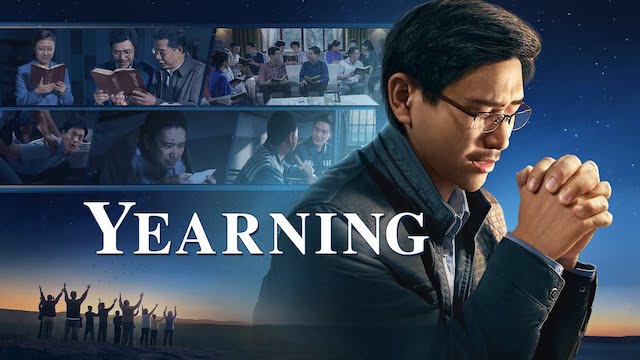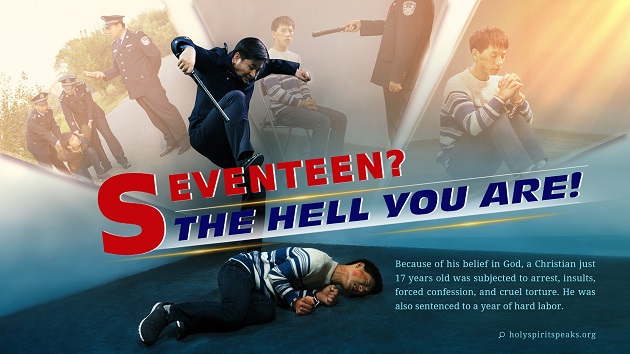Review of Xiaozhen’s Story: A Mirror of Life
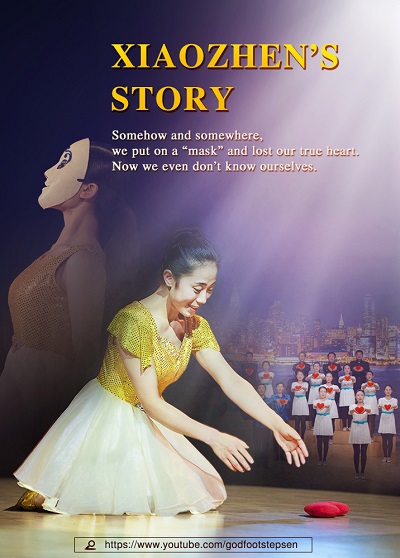
Last month, Xiaozhen’s Story, a Christian musical, attracted much attention at the Christian Film Festival in Virginia, USA, picking up 9 awards, including best director, best original screenplay, and best musical score. It is the seventh time this musical won prizes at film festivals abroad.
Xiaozhen’s Story is a musical produced in November, 2015. There are 6 scenes in the play: Rock-Paper-Scissors, Fight Over Gold, Abandoning the Good and Following the Wicked, Degeneration, Life in the Ballroom and Returning. In the play, Xiaozhen and her friends stray from God for money and fame. Xiaozhen gets lost and suffers great torment, only to find that she still feels empty even when she gets all she wants. At that moment, she comes to her senses and returns before God where she gets peace and happiness in her spirit.
From a fortuitous opportunity, I watched this musical a year ago, which deeply impressed me with the tortuous life journey of the heroine, the compelling story, as well as the important message it conveys. When I watched this musical again, I found more profound implications. I’m sure that the social phenomenon and ugly human nature it reveals as well as the life lessons it teaches will resonate among all those who have watched it.
A Mirror of the Living World
In the opening scene, some children raise a question that has bothered mankind for ages while playing games: Where does man come from? The characters representing people from all walks of life have different views on this issue.
Xiaozhen, the representative of theists, believes that man is created by God. The big cross on her chest shows her Christian identity. The pure white dress suggests her innocence and kindness.
Xiaoda, an admirer of Darwin’s theory of evolution, believes that man is evolved from apes. He is also a representative of the yes-men who bully the weak and fear the strong.
Xiaokexue, a typical materialist, believes in science and explains all things in a scientific way.
Glasses, the representative of intellectuals, reads a lot and advocates the doctrine of Confucius and Mencius. In this musical, many famous quotes of Satan, such as “God and demons don’t exist at all,” “Humans obviously originated from nature,” “The worth of other pursuits is small; the study of books excels them all,” “Every man for himself, and the devil takes the hindmost,” “I have to fight! I must contend!” etc. are all spoken from his mouth. He also represents those sophisticated and cunning men who are good at trimming the sails to the wind.
Xiaoshitou, an ordinary girl of little knowledge, believes that man leapt from stone. She represents those cowardly people who place money above everything and believe that money can bring them peace.
Huahua, the representative of people who greedily enjoy the flesh, argues that life is so short that man should spend time enjoying great wealth and delicious food.
Datou, the antagonist, appears in the second scene Fight Over Gold. He is a bully who takes the lion’s share of the gold with force, representing the powerful and influential in society. When Xiaozhen asks to get back the gold that belongs to her, he immediately takes a knife from his belt and threatens to kill her. Everyone present is frightened by his insolent laugh and cold-blooded evil face.
Through ingenious design, the director shows different outlooks on existence and value within one single scene, and displays different manners of life, arousing the audience’s curiosity about the fate of Xiaozhen and other characters.
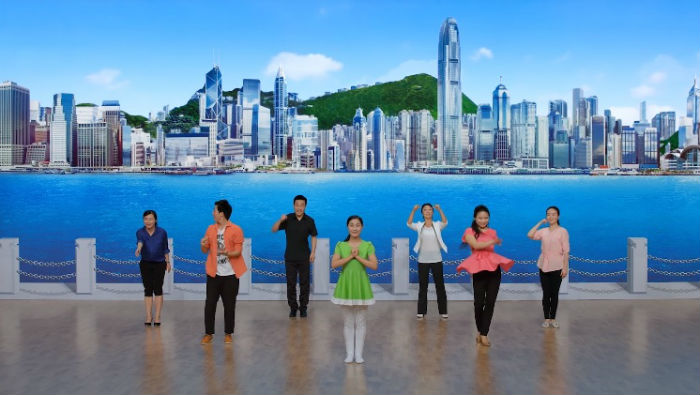
A Society Onstage
Movies attract the audience with stories, while the charm of musical lies in music and expressive performance as well as various performing arts it uses to develop the theme.
Fight Over Gold
At the beginning, the joyful dance expresses the curiosity and expectation of the young people who just step into society. They all have bright blueprints for the future. Everything is so beautiful. You can’t tell good and evil from their looks. Then appears the gold. The joyful balletic movements of Xiaozhen accompanied with airy tune show her curiosity and excitement of discovering the gold, while the fierce fight among people, along with the drumbeats and orchestral music, vividly interprets the sayings “Every man for himself, and the devil takes the hindmost,” and “Man will do anything to get rich.” From comrades to combat, the brilliant performance of the actors mirrors the cruel real world where people all worship money. Ironically, after Xiaozhen’s friends carve up the gold, they jauntily leave the stage chanting “Men at their birth are naturally good. Their natures are much the same; their habits become widely different.” They actually use this old saying as an excuse for their robbery, which fully exposes their greed, viciousness, and hypocrisy. The audience, while hating these robbers from the heart, feels sympathy for Xiaozhen’s misfortune. The erhu solo and the interpretative dancing show us the pain of betrayal Xiaozhen suffers.
Life in the Ballroom
Life in the Ballroom is the most beautiful and richest scene of the play, with excellent choreography, music, costumes and dancing. It is a foreshortening of the modern society with people from all walks of life. When night falls, men and women wearing various masks waltz in this glamorous city. It is to be observed that the masks represent their social classes. The “lion” and “cheetah” represent people of high status; the “wolf” represents the middle class; the “deer” and “zebra” represent common people. Through superb choreography, the director uses various types of dance like waltz, paso doble, cha-cha, and tango to present us different phases of Xiaozhen’s life as well as the degree of her corruption. While making a gripping narrative, it increases the artistic quality of this musical.
In the cha-cha part, Ms Cheetah leads while Xiaozhen follows, which symbolizes the suppression Xiaozhen suffers when she just steps into society. When she gets money by pleasing Ms Cheetah, her movements immediately become lighter, which suggests her happiness and excitement. Then Xiaozhen tangos with Mr Wolf. At first, she is reluctant to do so and doesn’t know how to dance. But later she tries to match his steps, which hints at her adaptation to the evil trend. She compromises and lays down her dignity just to get money, forgetting about the righteous life. When she gets the necklace, she becomes more ambitious and begins to look for more opportunities to make fortune. She tries every means to get the attention of Mr Lion, flattering him to get what she wants. After a waltz, Mr Lion gets bored with Xiaozhen. Then she does all she can to keep staying with him. When he gives her the gold, she excitedly repeats, “Gold! I got the gold!” This reminds us of the scene in which Xiaozhen admires her friends who get the gold. Now she gets the gold, too. The excitement on her face seems to tell us that she finally is going to live the highest life.
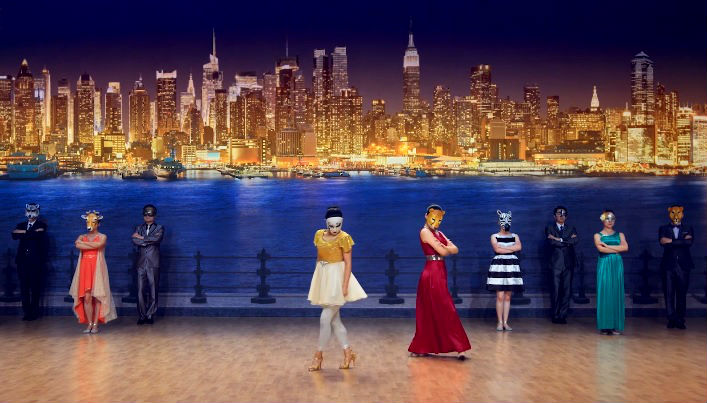
After a passionate hip-hop dancing, Xiaozhen becomes powerful. With years going by, Xiaozhen has her own place in society and is capable of meeting challenges. The scene of Xiaozhen dancing with Ms Zebra reminds us of the time when she dances with Ms Cheetah. The similar scenes are like a cursed cycle which mirrors a dog-eat-dog world where people act according to the law of the jungle—the powerful and rich call the shots. After grabbing the clothes from Ms Deer, Xiaozhen stands there laughing wildly, showing off her booties narcissistically. The benefits she gets make her stronger bit by bit and the hip-hop dancing suddenly changes to aggressive paso doble. Xiaozhen becomes sophisticated as she mounts in society. With the tempo of the music quickening, the pace of the actors on stage also gets increasingly fast. The uncomfortable scene implies the continual corruption of human being. People around her all come to pull her, striving to create a relationship with Xiaozhen, so she is kept constantly busy dealing with interpersonal relations, which makes her feel exhausted mentally and physically. Suddenly, the upsetting electronic music turns into solemn organ music with strong religious overtones. The resounding soprano solo makes the audience feel like they are in a church. They seem to get closer to God whom their spirits belong to…. When it comes to the climax, Xiaozhen, letting out a scream, frees herself from others and tears off her mask. Then, with another scream, she falls down to the ground—she is completely ruined! People around are just looking on and sneering, which adequately reflects an impersonal society where there is nothing but interest among people. The smooth performance attracts the audience all the way to the end of the scene.
At first, Xiaozhen looks down on this way of life. But then, she gives up her innocence and kindness in order to survive. She is no longer green or clumsy but becomes mature and seasoned. Living with a mask, she gets more and more insensitive until being ruined by this dark world. The dancing, like silent words, records the course of Xiaozhen’s degeneration and breakdown.
Every time I watch this scene, I seem to receive a baptism of life. I believe many people will find themselves in this scene. Just like Xiaozhen who loses herself, we are all following the evil living rules of the world unconsciously and reluctantly. What behind the glamour is nothing but emptiness and confusion.
The Root-Seeking Journey
Apart from the artistic value, this play succeeds in making people reflect upon life: Where do we come from? How should we live? Xiaozhen believes that we are created by God, but she doesn’t know God, and neither does she know God’s requirements of us. She gives her heart to the world and values friendship, but in the end, she compromises and becomes insensitive merely to stay alive, living like the walking dead. Similarly, many people devote themselves to money, status, careers, marriages and all that they love. They think that they can live without God but can’t carry on living if they lose any of these things. They don’t know that material pleasure can’t fill the void until they go through sufferings. Fortunately, Xiaozhen finally knows God’s requirements of man after she experiences lots of sufferings. At the end of the play, Xiaozhen gets back her lost true heart and returns before the Creator. Her face is shining with peace and pleasure. The powerful scene where the dancers struggle to tear off their masks deeply touched the audience. It confirms that when we depart from God and lose His care and protection, we can only be tormented by Satan. We have no light, but sufferings only. Only when we give our hearts to God, regard Christ as our rock, and accept God’s words as life guidance, can we find our souls the place of rest.
Though this musical merely tells the story of Xiaozhen, I believe everyone will find himself in Xiaozhen’s experiences. We should rethink to whom we have given our hearts. Have we given them to God? As it says in the theme song “God Is Seeking Your Heart and Your Spirit”: “But you should know now where your heart and spirit are.” This is the Creator’s call of men’s souls, and also the most important thinking of life this musical brings to us!
Xiaozhen's Story Trailer:
Watch Xiaozhen's Story Full Video

